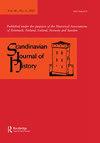为一个国家打造一个伟大的叙事:第二次世界大战期间芬兰历史的剧本
IF 0.8
3区 历史学
Q1 HISTORY
引用次数: 0
摘要
在我们的文章中,我们研究了芬兰历史学家如何在两个时期(1939 - 1940年冬季战争期间和1944年继续战争的最后阶段)制作历史文本,并将其应用于芬兰军队内部,用于向普通士兵授课、演讲和非正式谈话。在这项任务中,我们采用叙事学的方法,通过讲述“芬兰”和“芬兰人民”与俄罗斯进行永恒的、存在的斗争的故事,来研究有目的地构建一个关于国家过去的主要叙事。我们把历史文本当作紧急脚本,提供给特定的士兵观众,这样他们就能内化他们当前处境和经历的历史框架。历史文本强调了芬兰历史不可避免的连续性和目的论。这是通过构建一个巨大的历史背景来实现的,通过重复过去的关键图像和类似物,将当前的苦难嵌入其中,为芬兰人民保留了受苦者和体验者的角色。历史学家的战时描述提供了一个例子,说明主叙事是在官方的支持下有目的地建立和传播的。本文章由计算机程序翻译,如有差异,请以英文原文为准。
Forging a master narrative for a nation: Finnish history as a script during the Second World War
ABSTRACT In our article, we study how Finnish historians produced historical texts to be applied inside the Finnish army to give lessons, speeches, and informal talks to the rank-and-file soldiers during two periods: first during the Winter War of 1939–40 and then in the last stages of the Continuation War in 1944. Employing narratological methodology to this task, we examine the purposeful construction of a master narrative of the national past by telling the story of ‘Finland’ and the ‘Finnish people’ in their perpetual, existential fight against Russia. We approach the history texts as emergent scripts that were offered to the particular audience of soldiers so that they would internalize the historical framework of their current situation and experiences. The history texts underline the inevitable continuity and teleology of Finnish history. This is done by constructing a vast historical context into which the hardships of the present moment are embedded through repeating crucial past images and analogues, which reserved the role of sufferer and experiencer for the Finnish people. The historians’ wartime accounts offer a case where the master narrative is purposefully built and propagated under official auspices.
求助全文
通过发布文献求助,成功后即可免费获取论文全文。
去求助
来源期刊

SCANDINAVIAN JOURNAL OF HISTORY
HISTORY-
CiteScore
1.10
自引率
20.00%
发文量
33
期刊介绍:
Scandinavian Journal of History presents articles on Scandinavian history and review essays surveying themes in recent Scandinavian historical research. It concentrates on perspectives of national historical particularities and important long-term and short-term developments. The editorial policy gives particular priority to Scandinavian topics and to efforts of placing Scandinavian developments into a larger context. Studies explicitly comparing Scandinavian processes and phenomena to those in other parts of the world are therefore regarded as particularly important. In addition to publishing articles and review essays, the journal includes short book reviews. Review essay proposals and polemical communications are welcomed.
 求助内容:
求助内容: 应助结果提醒方式:
应助结果提醒方式:


